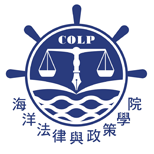Introduction to the Centre
Taiwan is surrounded by the sea on all sides and has built its economy around the ocean, which necessitates continuous improvements in the standards of its maritime industries. The development of the maritime industry is closely linked to international maritime laws and policies. Therefore, the purpose of establishing this centre is to explore the development of international maritime laws and policies, assist Taiwan's maritime industry in enhancing its competitiveness, and provide references for the amendment of relevant domestic regulations.
Additionally, Taiwan's maritime legal system, in comparison to the major maritime countries, will gradually lose its advantages if it continues to follow outdated legislation without innovative legislative policies. One of the primary reasons for this is that since the passage of UN General Assembly Resolution 2758 in 1971, Taiwan has been unable to participate in the formulation of international maritime law regulations in international organizations, such as the United Nations specialized agencies UNCTAD, UNCITRAL, IMO, and CMI. This lack of participation has resulted in Taiwan missing out on international legislative and judicial practice experience. Moreover, Taiwan lacks an internal legislative mechanism to respond to this international reality, keeping pace with the development of international regulations and fully incorporating them into domestic law. Since Taiwan is not a contracting state, it is not bound by the convention. As a result, in terms of legislative drafting techniques, lawmakers often behave like customers at a buffet, selectively choosing certain provisions or the spirit of some international conventions to incorporate or modify the mandatory provisions of the convention into domestic law. This leads to legislative gaps, where the full text of the convention should have been included but was not, or breaches of the faithful performance obligations expected of contracting states. This has become a unique legislative practice in our country over the past 50 years. Consequently, judgments rendered by our courts applying domestic law are not recognized by courts in contracting states and cannot be enforced, creating legal risks that affect the international credibility of our legislation and judicial system.
Therefore, in addition to collaborating with official authorities and the maritime industries, this centre also strengthens the university's voice and leadership in relevant fields through the implementation of related research projects. We aim to contribute to the formulation and development of maritime laws in Taiwan and aspire for this centre to become a think tank for the government.
In addition, the study of international maritime law and policy involves a multidisciplinary approach, including international maritime law, international ocean law, navigation and marine engineering technology, shipping management, and international trade. This centre will integrate the maritime expertise within the college and establish strong connections with the university's marine disciplines. Through interdisciplinary research, we aim to achieve a leading position in the country regarding international maritime law and policy. We will also integrate the university’s research resources and technologies to seek cross-ministry research projects from the government, enhancing our research capacity in international maritime law and policy. In addition, we will organize expert forums and international conferences, inviting industry professionals to share issues faced by the industry and discussing future trends in technological innovations with domestic and international experts. Our goal is to contribute research outcomes to society and the economy, providing participants with future research directions. We will also collaborate with foreign universities to hold academic seminars, exchange students, host visiting scholars, or promote dual degree programs, thus facilitating the integration of our faculty and students with maritime law and policy scholars from neighboring countries. Through academic exchange, we aim to enhance the university's international visibility in the field of maritime law and policy and strengthen our influence on maritime law and policy issues.
